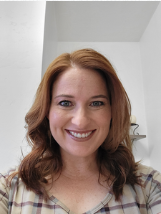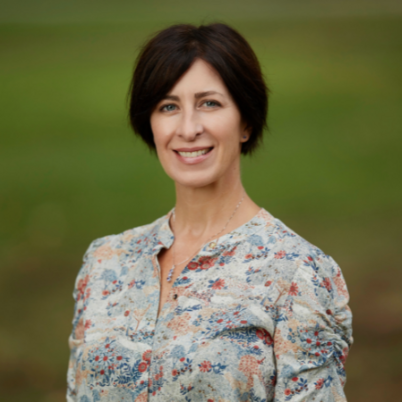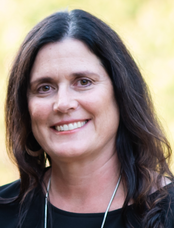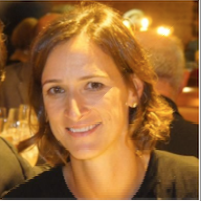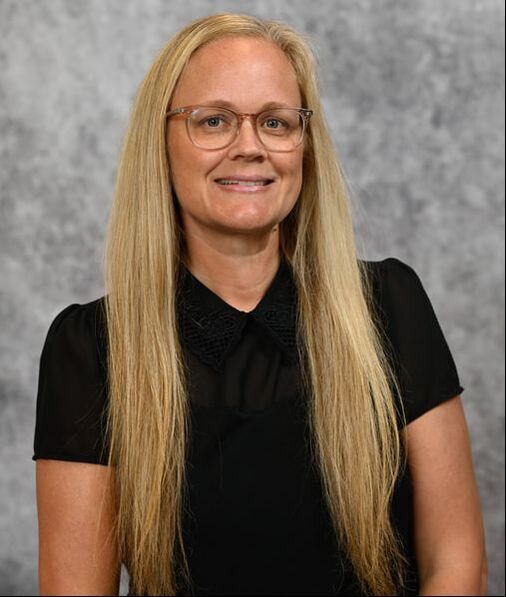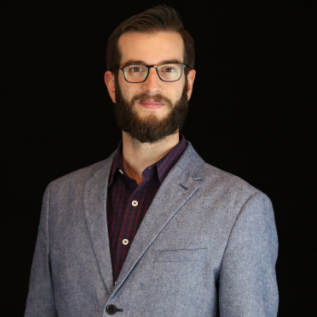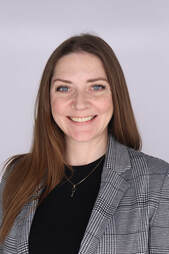Emma Bullock
|
Bio: Emma Bullock, Ph.D., is an Associate Professor of Mathematics Education in the Mathematics and Statistics Department, College of Science and Engineering, at Sam Houston State University in Huntsville, TX just north of Houston. She researches the design of, and teachers’ use of, digital math tools and other visual mathematics representations and studies the intersection between student mathematics achievement and school leadership, modeling schools as complex adaptive systems (CAS). In particular she focuses on visualizations of CAS and mixed methods research study design. At SHSU she teaches undergraduate and graduate mathematics and pre-service teacher mathematics content courses and enjoys mentoring and working with both undergraduate and graduate students in all aspects of her research, teaching, and service. She currently serves as the current president of the Southwest Education Research Association (SERA), on the board of the Mixed Methods International Research Association (MMIRA), and as the chair of the Complexity Theories in Education SIG of AERA.
Roles and Responsibilities: The Chair shall be responsible for the general administration of the SIG, for ensuring that the SIG Bylaws are followed, and shall act as liaison between the SIG and AERA and the SIG and the SIG Executive Committee. The Chair shall preside at all meetings of its Executive Committee and at the Annual Business Meeting. The Chair shall act as parliamentarian or shall appoint a SIG member to serve in that role for each meeting. The Chair shall appoint ad hoc committees as needed. Unless otherwise specified in these Bylaws, the Chair of the SIG shall appoint persons to assist officers, to chair committees or to carry out other work of the SIG.
Roles and Responsibilities: The Chair shall be responsible for the general administration of the SIG, for ensuring that the SIG Bylaws are followed, and shall act as liaison between the SIG and AERA and the SIG and the SIG Executive Committee. The Chair shall preside at all meetings of its Executive Committee and at the Annual Business Meeting. The Chair shall act as parliamentarian or shall appoint a SIG member to serve in that role for each meeting. The Chair shall appoint ad hoc committees as needed. Unless otherwise specified in these Bylaws, the Chair of the SIG shall appoint persons to assist officers, to chair committees or to carry out other work of the SIG.
Gwen Marchand
|
Bio: Gwen C. Marchand is the interim Associate Vice President for Research, the former Associate Dean of Research and Sponsored Projects in the College of Education, and a Professor of Educational Psychology. She has research expertise in academic motivation and engagement classroom systems, collaborative team processes, and research design/methods. Her work has been published in top journals including Educational Psychologist, the Journal of Educational Psychology, and Contemporary Educational Psychology. She is the co-editor of two methods-focused special issues, including one on mixed methods for Contemporary Educational Psychology, and one on complex systems approaches to educational research in Journal of Experimental Education. Dr. Marchand’s work has been funded by a variety of sponsors at the federal and local levels; she is currently the principal investigator on a collaborative National Science Foundation project.
Roles and Responsibilities: The Secretary/Treasurer role is responsible for managing and reporting on the financial accounts of the SIG and the safe keeping of all financial documents of the SIG. The role includes collating and reviewing financial reports from AERA, coordinating expenditures on behalf of the SIG, and supporting planning and finances of SIG activities at the annual meeting of AERA. The Secretary/Treasurer works with the executive committee to engage with communication planning and production for the SIG and in documenting the work of the SIG at meetings and events.
Roles and Responsibilities: The Secretary/Treasurer role is responsible for managing and reporting on the financial accounts of the SIG and the safe keeping of all financial documents of the SIG. The role includes collating and reviewing financial reports from AERA, coordinating expenditures on behalf of the SIG, and supporting planning and finances of SIG activities at the annual meeting of AERA. The Secretary/Treasurer works with the executive committee to engage with communication planning and production for the SIG and in documenting the work of the SIG at meetings and events.
Heather P. Williams
|
Bio: Dr. Heather P. Williams is an Associate Professor and Program Coordinator for Executive Educational Leadership at Boise State University in Boise, Idaho. Williams transitioned to higher education in 2014 after spending over twenty years as a teacher, curriculum director, principal, superintendent, and school improvement consultant in primarily rural and low socio-economic PK-12 school systems. Her work focuses on policy implementation, system improvement, and networks for supporting leaders and learners – especially those from marginalized and underserved populations, particularly in rural communities. Dr. Williams’s teaching and research focus on preparing and supporting school system leaders with the knowledge and capacity to navigate complex educational issues and systems. Her research involves understanding complex adaptive leadership and sense-making related to events in the leadership journey.
Heather’s background in teaching prior to her work in administration was in the sciences (biology) so the traditional theories of leadership just never made complete sense to her, until she started learning about complexity theories several years ago. Dr. Williams is excited to be part of this growing field of scholarship.
Roles and Responsibilities: Each SIG’s Program Chair is responsible for executing the various tasks necessary to plan for his/her SIG’s portion of the Annual Meeting. These tasks are delineated more specifically in the Annual Meeting Procedures Handbook provided to SIG Program Chairs during the summer prior to the Annual Meeting for which they are preparing. Among other things, it is the Program Chair’s responsibility to: a) Promote, if appropriate, the Annual Meeting’s “theme” established by the AERA President when encouraging his/her SIG members to submit proposals. b) Constitute a peer review panel by inviting expert reviewers and/or volunteer reviewers. c) Become adept at using AERA’s on-line system for proposal submission/review by attending the web-based training session for Program Chairs. d) Ensure that each submitted proposal receives a fair and unbiased review (by a minimum of three reviewers) by the deadline established by AERA. e) Make a final accept/reject decision for each proposal by the deadline established by AERA. f) Encourage members of his/her SIG to volunteer and serve as Chairs and Discussants.g) Make sure that sessions are created by the deadline established by AERA. h) Oversee all aspects of the program preparation process such that his/her SIG’s portion of the Annual Meeting is of the highest quality possible. For example, SIG Program Chairs should remind all presenters that they must submit their final papers electronically to the AERA online system for use by discussants and chairs by the deadline established by AERA.
Heather’s background in teaching prior to her work in administration was in the sciences (biology) so the traditional theories of leadership just never made complete sense to her, until she started learning about complexity theories several years ago. Dr. Williams is excited to be part of this growing field of scholarship.
Roles and Responsibilities: Each SIG’s Program Chair is responsible for executing the various tasks necessary to plan for his/her SIG’s portion of the Annual Meeting. These tasks are delineated more specifically in the Annual Meeting Procedures Handbook provided to SIG Program Chairs during the summer prior to the Annual Meeting for which they are preparing. Among other things, it is the Program Chair’s responsibility to: a) Promote, if appropriate, the Annual Meeting’s “theme” established by the AERA President when encouraging his/her SIG members to submit proposals. b) Constitute a peer review panel by inviting expert reviewers and/or volunteer reviewers. c) Become adept at using AERA’s on-line system for proposal submission/review by attending the web-based training session for Program Chairs. d) Ensure that each submitted proposal receives a fair and unbiased review (by a minimum of three reviewers) by the deadline established by AERA. e) Make a final accept/reject decision for each proposal by the deadline established by AERA. f) Encourage members of his/her SIG to volunteer and serve as Chairs and Discussants.g) Make sure that sessions are created by the deadline established by AERA. h) Oversee all aspects of the program preparation process such that his/her SIG’s portion of the Annual Meeting is of the highest quality possible. For example, SIG Program Chairs should remind all presenters that they must submit their final papers electronically to the AERA online system for use by discussants and chairs by the deadline established by AERA.
|
Kelly McKie & Robin Anderson
SIG Webmasters University of Delaware & North Carolina State University [email protected] & [email protected] |
Bios: Dr. Kelly McKie completed her doctoral studies at the University of Ottawa, in Ontario, Canada under the supervision of Dr. Christine Suurtamm. Her dissertation, titled The Complexity of Mathematics Teachers’ Collaborative Professional Learning, used complexity science as a theoretical framework to study how learning emerged, was sustained, and diffused from a large-scale professional learning initiative in Ontario, Canada. She currently is a postdoctoral researcher at the University of Delaware under the supervision of Dr. James Hiebert on the NSF funded project Improving Professional Development in Mathematics by Understanding the Mechanisms that Translate Teacher Learning into Student Learning. This project will provide her the opportunity to extend her doctoral study and consider two different professional learning initiatives, formed in different jurisdictions with different contexts yet still focused on similar goals of enhancing the teaching and learning of mathematics in schools.
Dr. Robin Anderson is an assistant professor of mathematics education at North Carolina State University. She completed her doctoral studies at Stanford University. Currently she researches mathematics teacher learning through informal communities in online spaces. Her work amplifies the importance of teacher choice in their professional development by highlighting their self-generated learning experiences.
Roles and Responsibilities
The SIG’s Webmasters are responsible for ensuring the effective functioning, optimization, and maintenance of the special interest groups online presence, including the website and related digital platforms. The webmasters contribute to enhancing the SIG’s outreach efforts, disseminating research findings, and fostering engagement within the education community. Management of the SIG’s website includes:
Dr. Robin Anderson is an assistant professor of mathematics education at North Carolina State University. She completed her doctoral studies at Stanford University. Currently she researches mathematics teacher learning through informal communities in online spaces. Her work amplifies the importance of teacher choice in their professional development by highlighting their self-generated learning experiences.
Roles and Responsibilities
The SIG’s Webmasters are responsible for ensuring the effective functioning, optimization, and maintenance of the special interest groups online presence, including the website and related digital platforms. The webmasters contribute to enhancing the SIG’s outreach efforts, disseminating research findings, and fostering engagement within the education community. Management of the SIG’s website includes:
- overseeing the development, maintenance, and continuous improvement of the SIG’s official website, ensuring it is up-to-date, visually appealing, and user-friendly.
- collaborating with SIG officers to ensure that the website's layout, navigation, and content align with the organization's communication strategies.
- Updating and publish new content, such as research articles, publications, news, events, and multimedia resources.
Joey Eisman
|
Bio: Joey Eisman is a PhD candidate at Temple University studying Educational Psychology. Using complex dynamic systems approaches, his research explores the relationship between emotions/empathy and identity, motivation, and creativity in educational contexts. Eisman is currently working on several research projects including his dissertation work on teacher empathy and as a member of an intercollegiate, interdisciplinary research team funded by the James S. McDonald Foundation exploring the roles and contexts that motivate discussion practices in social studies classrooms. Beyond this SIG, he is a member of AERA’s Motivation in Education of the Graduate Student Committee and an APA Division 15 Graduate Student Ambassador. Eisman received a BS in neuroscience from the University of Michigan and an MA in Cognitive Studies in Education from Teachers College, Columbia University.
Roles and Responsibilities: The SIG’s Graduate Student Representative is responsible for organizing graduate student programming including webinars and the SIG’s premier mentorship program, the “Sprint” program. Additionally, this role communicates directly with graduate students and advocates for graduate students within the SIG.
Roles and Responsibilities: The SIG’s Graduate Student Representative is responsible for organizing graduate student programming including webinars and the SIG’s premier mentorship program, the “Sprint” program. Additionally, this role communicates directly with graduate students and advocates for graduate students within the SIG.
Bio: Ali Holmes is a Ph.D. candidate in Educational Psychology and Research Methodology at Purdue University. She uses a complex dynamic systems approach to investigate preservice teachers’ authentic identity exploration experiences within the teacher education program. Beyond her dissertation on preservice teachers' identity exploration, her other line of research investigates URM-FY students' emotions and self-regulation within the context of a learning-to-learn course. In addition to her role within the SIG, she is a member of AERA’s Motivation in Education Graduate Student Committee. She is Chair of Purdue’s Graduate Student Council Grant Review and Allocation Committee. Ali received her Bachelor's degree in Psychology and Child, Youth, and Family Studies at Portland State University and her master's in Educational Psychology and Research Methodology at Purdue University.
Roles and Responsibilities: The SIG’s Junior Graduate Student Representative serves a two-year term. Their responsibilities include assisting the Senior Graduate Student Representative with graduate student programming, co-facilitating the webinar series, co-producing the newsletter with the secretary, the “Sprint” mentorship program, and AERA programming.
Roles and Responsibilities: The SIG’s Junior Graduate Student Representative serves a two-year term. Their responsibilities include assisting the Senior Graduate Student Representative with graduate student programming, co-facilitating the webinar series, co-producing the newsletter with the secretary, the “Sprint” mentorship program, and AERA programming.

Hande Fenerci
Junior Graduate Student Representative
Virginia Tech
Bio: Hande Fenerci is a third-year doctoral student and a graduate research assistant in the Educational Psychology program in School of Education at Virginia Tech. Her research interests include motivation, engagement, inclusive motivational climate, and complexity theories in education with a focus on complex dynamic and adaptive systems. She investigates motivational climate as a complex dynamic system. She studies under the supervision of Dr. Brett D. Jones, and is a researcher in the MUSIC Model of Motivation Research Lab.
Roles and Responsibilities: The SIG’s Junior Graduate Student Representative serves a two-year term. Their responsibilities include assisting the Senior Graduate Student Representative with graduate student programming, co-facilitating the webinar series, co-producing the newsletter with the secretary, the “Sprint” mentorship program, and AERA programming.
Junior Graduate Student Representative
Virginia Tech
Bio: Hande Fenerci is a third-year doctoral student and a graduate research assistant in the Educational Psychology program in School of Education at Virginia Tech. Her research interests include motivation, engagement, inclusive motivational climate, and complexity theories in education with a focus on complex dynamic and adaptive systems. She investigates motivational climate as a complex dynamic system. She studies under the supervision of Dr. Brett D. Jones, and is a researcher in the MUSIC Model of Motivation Research Lab.
Roles and Responsibilities: The SIG’s Junior Graduate Student Representative serves a two-year term. Their responsibilities include assisting the Senior Graduate Student Representative with graduate student programming, co-facilitating the webinar series, co-producing the newsletter with the secretary, the “Sprint” mentorship program, and AERA programming.
